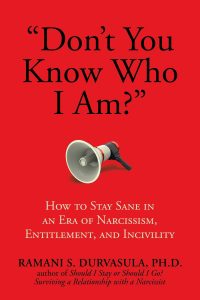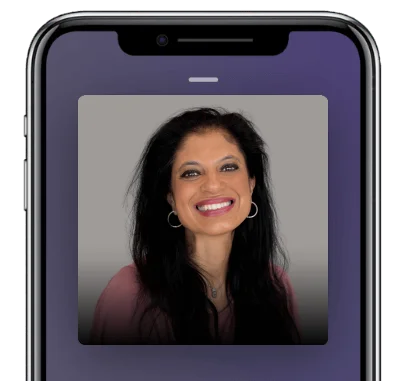In this Episode
- [00:40]Stephan introduces Dr. Ramani Durvasula, a psychologist, professor, speaker, and author of the book Don’t You Know Who I Am?: How to Stay Sane in an Era of Narcissism, Entitlement, and Incivility.
- [06:19]Dr. Ramani differentiates the five types of narcissism and ranks them from malignant to subtle.
- [14:51]According to Dr. Ramani, the population of narcissistic personality disorder in the US is 2-6% based on research, but following the mentioned patterns, it would be around 25-30%.
- [16:51]An enumeration of how to diagnose a narcissistic personality disorder
- [19:35]What is the difference between a narcissist, psychopath, and the sociopath?
- [25:33]Dr. Ramani shares her own experience with a narcissistic.
- [30:01]What is gaslighting and why is it the most toxic thing a person can do to you?
- [47:50]Dr. Ramani explained why it’s called an emotional vampire.
- [50:47]Why the “hostage negotiator voice” is effective when talking to a narcissistic.
- [52:27]Learn more from Dr. Ramani’s website, books, and social media accounts.

I am just so excited because I’ve heard you speak at Genius Network. It was just so valuable and insightful. Inspiring because, with information that is actionable, you can make different choices and not be a victim but be in charge of your own destiny, choose who to work and associate with. So, I’m very excited to have you on the show.
First of all, let’s start with a simple definition of narcissism. We can delve into a little bit deeper because I know there are multiple types of narcissists. I think you have three different types of narcissists. We’ll get to that.
Probably expand that.
Okay. I can remember at least three, like the noble narcissist, etc. Let’s first cover just a very simple definition because that will help get everybody listening on the same page.
Narcissism is an adjective. It’s not a diagnosis. It’s a descriptive term that usually signifies a personality pattern. This is a personality pattern that is characterized by patterns like inconsistent or superficial empathy, entitlement, grandiosity, arrogance, superficiality, chronic validation-seeking, hypersensitivity, a propensity towards rage, especially when the person is frustrated or disappointed, and then incapacity to deal with frustration and disappointment.
We also know that this all coalesces around core insecurity. People might say, “Well, why is this pattern? Why does it exist?” Because the person inherently is insecure. All of these things are meant to almost be like protection. Imagine the inside of you is this fractured, insecure core, you’re going to come up with things to wrap it up. So all this other stuff, the entitlement, the grandiosity, all the rest of it, is like bubble wrap that wraps that insecure core to protect them from the world, and it really creates a lot of distance between them in the world.
Take note of different types of narcissists: Malignant, Classical, Covert, Noble, and Benign.
Believe it or not, they’re also incredibly successful people. They tend to be the ones running our companies, our countries, our everything. This is where it’s very challenging that this very pattern that’s not good for us, is actually something we also at the same time reward.
And they can be real charmers.
They’re very charming. They’re very charismatic. They’re very confident. They’re very well put together. They’re very attractive. It’s very hard for my position to be in this place where I’m telling people, “Yeah, don’t be interested in something who’s charming, charismatic, confident, and attractive. I don’t recommend it.”
These are warning signs.
Yeah, which is sort of silly. But I do tell people, charisma is one of those patterns where it’s very engaging. When you see things like charisma, enjoy it, but then there’s almost like a red flag. Pay attention. Is this masking something else? In the midst of all this charisma, are they also being dismissive to other people? Many times we give people who are charming and charismatic a free pass. I tell people that charm and charisma, you may want to enjoy them, but view them as a red flag that you should be on high alert looking for other patterns.
If you understand narcissism, you know mental health. Share on XRight. Stay vigilant.
Stay vigilant. Exactly.
Got it. If I could encapsulate all that into one sentence or even just a phrase that would help me to recognize a narcissist, what would it be?
They’re difficult, arrogant, insecure, hypersensitive people who do not care about you.
Okay. Now, there are those different types of narcissists because some are really nasty. I think you referred to them as malignant narcissists. Then, there are ones who are just doing all this good in the world, starting foundations, building libraries and what have you. They’re the noble narcissists. Let’s talk a bit about these different types.

I often tell people I think of it as almost like five different types of narcissism. We’ll start with the worst one of all which is the malignant narcissist. The malignant narcissist is actually somewhat dangerous. They’re all the things I listed that a narcissist can be but they can also be manipulative, coercive, exploitative, menacing, and even dangerous.
The malignant narcissist in a way almost looks like a psychopath. There are some differences which we can get into if you want. There are differences, but the malignant narcissist is a dangerous kind of a narcissist. You wouldn’t want this person as a boss. So they often are the boss. You certainly wouldn’t want to be in a relationship with this person but they can often be quite successful. They’re often known for running their work with an iron fist. People you wouldn’t want to get on the wrong side of.
The classical narcissist as I call them, and it’s also termed the grandiose narcissist, is your textbook definition of a narcissist. These are people who are charming, charismatic, attractive, grandiose, entitled, VIP. “Look at me, tell me I’m great. Aren’t I great? Come on my yacht. Fly on my plane. Come have dinner with me.”
“Don’t you know who I am?”
“Don’t you know who I am?” They’re that person. Your classical blowhard narcissist. That’s often what we’ve classically thought of them as your show-off, your salesperson, your carnival barker style of a narcissist.
The third type of narcissist is something more subtle and more attention is going here and more people are like, “Ah, I thought they weren’t a narcissist because they weren’t that grandiose, larger than life one.” The third one is called the covert or vulnerable narcissist.
The covert narcissist, I often call it the victimized narcissist. These are people who often have a tale of, “Woe is me. Life wasn’t fair to me. Life wasn’t kind to me.” They have a lot of contempt, contempt for why they’re being held to the same standards as everyone else. “I don’t understand why someone as smart as me actually has to go to college and get a degree. I’m so smart. I’m smarter than the professors.” Or they’re very victimized like, “Why didn’t the world recognize how great I am? I’m smarter than Steve Jobs. I thought of the iPhone before him. He just happened to have the right connections. But if people could have really seen how great I am.”
And yet, they’re still living a marginal existence in a marginal place and all this grandiose puffery is not coming out and they’re always seeming like a victim. They can be sullen. They can be very resentful. They can actually also look anxious and depressed, which is why when a covert narcissist shows up in a therapist’s office, which they sometimes do because they’re so bummed out how life is going, a lot of times they’re diagnosed with depression.
Our fourth type of narcissists are these noble or what have been more recently termed communal narcissists. Your communal narcissists are those do-gooders. They are like, “Everyone, let’s be positive together. Come on over to me and let’s go rescue elephants. Let’s start a foundation and let’s go to the developing world and take pictures of ourselves with orphans.”
Here’s the problem with the communal narcissist. The sole thing that’s largely mobilizing them to do all these good deeds is the validation they’ll get.
I love people who love people. I love people who want to give back to the world. Here’s the problem with the communal narcissist. The sole thing that’s largely mobilizing them to do all these good deeds is the validation they’ll get. If the communal narcissist doesn’t get enough validation for their good deeds, they get quite angry, frustrated, and unkind. They don’t seem so charitable anymore.
They will feel like, “Not enough people like my Instagram posts where I said I was going to rescue whatever animal of the week they’re going to rescue.” What’s even more striking is many people will say that communal narcissists can be rather cruel behind closed doors. The whole world will see the communal narcissist as this giving, charitable, big-hearted person who’s generous and gives to themselves. But then, when they’re behind closed doors with their partner, their families, or close associates, they’re very invalidating, cruel, and unimpacted.
That disconnect means being in a relationship with a communal narcissist is actually really difficult because the world is telling you how lucky you are that this is your father, your mother, your husband, your wife, or something like that, and you’re thinking, “Oh, my God. My relationship with them is terrible.”
The fifth type of narcissist is something I call the benign narcissist. What I mean by that is narcissism is on a spectrum. Not particularly vexing or problematic all the way to our severe malignant narcissist. At the low end of the spectrum, you have your benign narcissists or largely superficial people who care about superficial things. They probably don’t care much about your feelings, but they tend not to be intentionally cruel.

They’re great people to have at a party. It’d be fun if you’re going on vacation with them and a group of other people. You’d never want to count on them in a crisis. They’re never going to be helpful when your life becomes heavy, but they’re not intentionally mean. That’s why they are sometimes confusing to people who feel like, “They’re there, but they don’t ever seem to care about my feelings.” Well, that’s because they don’t and they’re pretty superficial. But like I said, you don’t experience intentional cruelty. They’ll spend hours and hours making sure they get more followers on Instagram sort of thing. They’re raised on for a living. That’s it.
The final group are what I call the neglectful narcissists. The neglectful narcissists are people we tend to experience in relationships. They just don’t care. If you’re in any kind of human relationship with them, they just don’t care. They don’t remember anything. They don’t listen to you. They don’t notice you’re alive. You could come in with a flaming baseball cap on fire, and they won’t even notice.
It can be very invalidating and destabilizing to be with a neglectful narcissist because they’re so not attuned to you in their space. Some people will like and it’s almost like dying on the vine. They’re not even going to water the plant. It’s a very empty kind of existence when you’re in a relationship with them.
Wow. I had no idea that there were that many kinds. That’s enlightening. You must have had some experience that sparked your interest in narcissists and narcissism.
Obviously, some personal experiences, but when those personal experiences were happening, I didn’t know that that’s what I was dealing with. It was really only years later when I got to work I’m like, “Oh, that’s what that was,” and I understood my vulnerabilities. I’ve encountered it in family settings, personal settings, professional settings. I encounter it every single day.
In fact, I’m already an introverted person. It’s made me even more introverted. Any day of the week, give me a choice of staying home or going out in the world, I’ll always choose to stay home because these patterns are everywhere and they’re so toxic. I find them upsetting, so I work on it all day. But I also got into it in my clinical work. I was seeing more and more clients who were talking about narcissistic relationships. I was doing research on health psychology, how health and psychology come together, medical conditions and psychology, and I was noticing more.
I was noticing it very specifically and how badly people treat healthcare providers. It was a subset of people and it was the narcissistic individuals. I got interested in it scientifically, clinically, and obviously, it hit my personal life and the personal lives of other people I knew. When I realized it was absolutely, truly, and completely clearly a pattern, I thought, “Wow, this is amazing. It’s almost like having X-ray glasses where you can see the next card that’s going to be dealt in Las Vegas. I’m going to be at the house. I get how this works every time and this is how it works every time.” Once you get the pattern, you actually can save yourself a lot of time in your life.
There’s a big benefit to having that pattern recognition, even more benefit if you have pattern utilization so that you can make different choices. You don’t just see the pattern but then you act on it, right?
Yes. And that’s the hard part.
It is, especially when you have feelings for the person and you’re not wanting to necessarily walk away. You use the word patterns. One word that came to my mind when you said the pattern was pathology. Would that be accurate?
It depends on the situation. I think in many cases, yes. I think that when we use the word pathology, it’s obviously patterns that are not good for the person who has them or good for other people. That’s how I see it. In more cases than that when we’re talking about narcissistic patterns, we’re talking about pathological patterns for sure.
Got it. What percentage of the population in the US would you guess or would you be able to give us a number based on the research of the total population? What percentage are narcissists?
When we look at narcissistic personality disorder, which is a specific diagnosis that you have to jump through a lot of hoops to give someone that diagnosis, the research only suggests that maybe somewhere between 2% and 6% of the population has that. The reason that’s so low is because many people with narcissistic patterns don’t have the other things you need for a diagnosis. And that’s namely that they’re having impairment in their lives or they feel distressed.
Narcissists often appear as successful, confident beings, but deep inside, they hold a fractured insecure core. Share on XWe can contrast that to something like depression. When a person has clinical depression, they’re distressed. They feel miserable, they’re sad, they can’t get out of bed, they can’t get things done. That subjective sense of distress is what pushes them over that long list of symptoms plus the distress equals the diagnosis.
But narcissistic personality, these people are succeeding. They’re the head of the company. They have lots of money. They happen to be married. Their wife or husband might hate them, but they don’t know that, and they actually don’t care. As far as they’re concerned, everything is hunky-dory and they don’t think that there’s anything wrong with them, so they don’t show up on that distress or impairment meter. That’s why that rate is lower.
People have asked me to spitball this number and I am literally spitballing this. I honestly think when we’re talking about enough narcissism in a person’s patterns so people can notice it, we’re probably talking somewhere between 15% and 25%. One in five to one in four people, where this is a real problem. If we really were liberal with the definition and included all those benign narcissists, we might be closer to 25% to 30%.
Wow, that’s shocking.
Not really. I mean, if you ever went to Costco on the weekend.
Sure, especially now with the run-in on the insanity around Coronavirus and we have to stockpile 10 weeks of diapers and stuff just in case. It’s a little nutty. But is there a test or an assessment that helps to determine if somebody has either just narcissism or has the clinical definition of narcissistic personality disorder which I guess that’s in the DSM? Is that right?
Yeah. In order to make the diagnosis of narcissistic personality disorder, you would go to a diagnostic manual and that would either be the Diagnostic and Statistical Manual of Mental Disorders or DSM, or to what’s called the ICD or International Classification of Diseases. That’s actually just as if not more widely used in the DSM. In there, they just have a long list of symptoms, and they say, “If you have five out of nine of these, and impairment or distress, then you have the diagnosis.” What gets tricky, though, is to measure narcissism in those other areas.
There is a scale-out there called the Narcissistic Personality Inventory. I’m not a big fan of it because I think it really only gets at the grandiose elements and it also includes pieces like leadership and assertiveness. In that way, it’s calling out something that’s much more like a puffed-up peacock narcissism versus the more toxic pieces of it that hurt other people. I feel like that scale is almost like what I call celebrity narcissism. It doesn’t really get the interpersonally problematic piece of it.
There’s also a scale called the Hypersensitive Narcissism Scale and that particular scale is designed to get at the covert narcissism. I think it’s a good start. I still think it doesn’t fully get at the resentful, sullen, contemptuous parts of covert narcissism.
There’s a lot of narcissistic people out there who think they’re incredibly empathic or they don’t think of themselves as entitled.
Here’s the challenge. Not a lot of people always cop to being like this. There’s a lot of narcissistic people out there who think they’re incredibly empathic or they don’t think of themselves as entitled. These are not people who have a lot of insight, to begin with. It’s very hard to assess the condition when a person doesn’t have insight.
Stephan, there are much more complicated psychological tests that can only be administered by a psychologist. These are very specialized personality tests. You’d only be given if you went into a psychiatric or psychological evaluation. It’s very expensive and very time-consuming. Certainly, those can start to lend a slightly brighter lens, but even those, I don’t always know that I agree theoretically with how they’re capturing narcissism. Is there a great way to do it? Honestly, sitting with someone for an hour, you tend to have a decent idea of who they are and that’s probably the best test we’ve got.
So, there’s not a BuzzFeed Quiz. Are you living with a narcissist? Take these 10 questions.
I’m sure BuzzFeed tried.
They tried.
No doubt, they’ve tried.
But it’s not accurate if they have one.
Probably not.
Let’s differentiate the narcissist versus the psychopath and the sociopath.
Narcissism, as I said, was that long list of things, the lack of empathy, entitlement, grandiosity, arrogance, all of that, and it’s all surrounding a core of insecurity. Psychopathy is a different animal. Psychopathy is something that has been actually researched a lot more than narcissism. Even the DSM doesn’t have a perfect correspondence to it.

There’s a disorder in the DSM called Antisocial Personality Disorder. But Antisocial Personality Disorder as it’s diagnosed and things like the DSM or the ICD is much more like a person who breaks rules, breaks the law, violates the rights of other people, and lies. Like using the aliases, it doesn’t have a consistent work history and all of that.
When we look at psychopathy, we’re seeing something a lot more chilling and cold-blooded. These are people who are very smart, very articulate, and very dangerous because they’re incredibly resistant to stress. When the whole world is burning down, they are still the ones eyeing the safe in the corner to make sure they get it out of there so they get all this stuff. They were a person who does not crack under pressure. They’re very anxiety- and stress-resistant.
Wasn’t that great? Not really, because it’s to the point where it almost feels like a cold surgical precision to it. They can be very calculating. They can certainly be very manipulative, very exploitative, very coercive. They’re very much motivated by power, by profit, and by pleasure. It’s very much only about them.
Here’s the key difference in my estimate between psychopathy and narcissism. Psychopaths are not insecure. They’re actually quite self-possessed. They don’t feel like human beings like the rest of us. Narcissists actually are rather insecure human beings who behave badly because they’re insecure. Psychopaths are almost devoid of the stuff that makes us human. The stuff like the empathy, the capacity for intimacy, the willingness to be with someone else’s emotion. They devalue all emotions because they really don’t have many themselves. They do not really have the capacity for empathy but they’re clever enough to know how to fake it to get something done, which is why they’re charming enough to lure a victim in.
Now, I’m curious. I’m really overreaching here because I don’t know this topic that well, but it seems like somebody could be born a psychopath. But a narcissist is probably made through some sort of trauma.
Yes. Trauma, poor attachment, a little bit of a temperamental, genetic, maybe being a bit more of a tightly wound-up child, that kind of thing. But it very much comes down to caregiver issues. It could be frank trauma, but it could even be things like having parents that are emotionally neglectful, not emotionally available, or very overindulgent materially, that sort of thing.
With a psychopath, there is definitely mounting evidence that there are genetic elements to psychopathy and that there were also central nervous system elements to psychopathy that we see differences in their brain functioning. The narcissism literature hasn’t been convincing in that space. It’s a tough area to study in terms of nature and nurture. You really have to do twin studies and adoption studies to really establish whether how much of this is genetic and how much of this is created by the environment.
The bottom line is you might have a person who has a psychopathic father, so there’s your genetic piece, biological father. If they are raised by that psychopathic biological father, they’re significantly more likely to be exposed to things like violence and trauma, which could also be the thing that makes them vulnerable. So, it’s that sort of a balancing act. That’s where psychopathy is again, quite chilling.
These are people who could be hired assassins. These are people who can actually be brilliant surgeons because they don’t sweat under pressure. When the artery gets cut, they’re very calmly just doing their job. Some people will say these are very cool people under pressure. They’d be great elite soldiers because the pressure of doing some of the most dangerous military work wouldn’t break their spirit. There are places in the world in which they fit. I would say an intimate relationship isn’t one of them.
And then a sociopath versus a psychopath.
A sociopath is a very complicated word. It’s a word that actually doesn’t have that much clinical meaning. It was a word that you see much more in the criminology and sociology literature. At our best guess, these people are elaborating on this construct of sociopathy. It’s definitely less biological than psychopathy as one belief right out the gate.
The other thing that some people suggest is that a psychopath actually genuinely doesn’t get that there are things that are wrong, like you don’t go and just kill people. A psychopath might be like, “They were in my way. I’m trying to get something done,” and then someone will explain the rule to them and say, “Okay, apparently you have a rule, but they don’t get the wrongness of it.” If that makes sense. Sociopath knows what’s right and knows what’s wrong and still violates the rules.
Narcissism is not suitable for us, yet it is something that the world praises thanks to social media culture. Share on XPsychopaths tend to be very cool and efficient and quite smart. Sociopaths tend to be a lot more sloppy and messy. I always say a great analogy would be a psychopath would be a person with a long-range rifle on top of a building, who does a hit from up there, and gets away before anyone finds them. A sociopath gets into a bar fight because they’re mad. Sociopaths tend to be more reactive with their anger. They definitely don’t have that cool efficiency, they may not even be as smart, and sociopaths are probably a little bit more likely to have had life histories characterized by trauma, neglect, and abuse. Whereas with psychopaths, it can be a crapshoot. There are people out there who are psychopathic and we don’t really always see it manifest in their early history per se.
If you could describe to us the absolute most malignant, awful example of a human you have interacted with?
Oh, that I’ve interacted with.
It could be a narcissist to psychopath or sociopath. Describe that person for us.
This is a person who got tremendous validation from his wealth and from his work. He tricked everyone in his social world who respected him because he succeeded in this group of people and succeeded better than anyone else. No matter how dismissive and cruel he was to other people, they always viewed it in the name of him doing his business and doing his good works and making a lot of money.
Because he had a lot of money, he also gave a lot of donation into his community and into the community in which he resided. People thought he was so honorable because of that. It really bought him a lot of credit even as he was a human wrecking crew. He would destroy people in business interactions. In fact, he really got a lot of joy out of writing deals and conducting deals in a way that the other person would really be left with nothing to the point where it would ruin their lives. Even though he didn’t need to do that, he got pleasure, almost sadistic pleasure out of ruining other people’s lives.
He was a very menacing human being. At certain events, when he would find a vulnerable person in his community, he would corner them and threaten them and walk away leaving that person trembling. That community was so invested in him, people would never believe the trembling person.
He’s somebody who had numerous extramarital affairs, gave his wife numerous STDs, and felt that was his right. It’s like, “I bring in the money. I have this big house.” He would insist his wife to degrading things in front of his friends in terms of how she dressed and presented herself. He just dehumanized every single human being he met. And yet, Stephan, if I went out into the world this person occupies, most people would say he’s a good guy. That’s what’s terrifying. This man lives amongst us. He’s a terrifying human being.
Oh, my goodness. Yikes! Okay. You mentioned the word sadistic. Where does that fit into the definition of a narcissist? Is that something that is common or unusual?
It’s not. Here’s what’s interesting about narcissists. Because of that core insecurity that they maintain, they actually even have more than a little bit of anxiety, more than you would think for being such hard-headed, mean people, they are not, as a rule, sadistic. It can feel like they’re being sadistic when they’re gaslighting you, doubting your reality, or manipulating you. It definitely feels sadistic, but it’s not that “rub your hands together. I’m going to tie you to the chair and torture you” sadistic. It’s very much like they are always going to put their needs first.
The narcissist is the person who will have the one night stand and hurt their wife or husband or something like that. They’ll do that, but they’ll feel entitled to it, and at the time they have the affair, they don’t think about how much it hurts the other person. They just want what they want when they want it.
The sadistic person would actually almost send a video back to the partner to hurt them. Sadism is very intentionally hurtful to the point where the person gets pleasure from it. And sadism is something we tend to see more in psychopathy, but not in traditional garden variety narcissism. As I said, it feels sadistic, but it doesn’t tend to fall under that clinical definition of what we call sadism which is something that I got to tell you. Other than maybe one person I’m sharing with you that I’ve known of, it’s not something I’ve seen that much.
Narcissists love to win. It motivates everything they do. They actually believe you can win in relationships, so it’s a big thing to them.
When a narcissist is hurt by someone, they definitely like to win. Narcissists love to win. It motivates everything they do. They actually believe you can win in relationships, so it’s a big thing to them. They really love the idea that their partner will get destroyed after the relationship ends, which is why narcissistic divorces can be very expensive. The narcissistic parent will try to take custody of the children merely to hurt the other partner with little regard that this will also hurt their children. So that feels sadistic.
Okay. You mentioned the term gaslighting. For those who aren’t familiar with that term, it’s essentially like crazy-making, right?
It’s crazy-making. It’s a form of emotional abuse that consists of doubting someone else’s reality and most often their emotional reality. You tell them that their feelings aren’t valid, that they have no right to feel that way, that they’re too sensitive. You’re basically acting like a judge and jury on their feelings, but then denying that feelings even exist, which if you’re having a feeling, it’s like you’re starving. You’re really hungry and somebody says, “Oh, Stephan, you can’t be hungry.” Like, “I’m hungry,” and they’ll say, “No, Stephan, you’re not hungry so we’re not going to give you any food.” Imagine that and it’s your emotions.
Right. That is denying the person’s reality.
Exactly what it is. It is cruel and it is psychological abuse. The challenge is, over time. Gaslighting can leave a person incredibly confused, full of self-doubt, incredibly anxious, and even depressed, helpless, and hopeless. And yet, it’s a form of abuse that’s not recognized by the courts.

Wow, I didn’t realize that. You mentioned in your presentation at Genius Network—I’m looking at my notes here—“If you understand narcissism, you understand mental health.” What do you mean by that?
So many of the patterns subsumed under narcissism which include (and I’m not putting these in any particular order) anxiety, depression, hypersensitivity, dysregulation, impulsivity are the things that make mental health the problem that it is, because these are the things that get in the way of having healthy relationships, succeeding in the workplace, succeeding as a person.
To me, narcissism is a big multifaceted stone. Once you understand all the facets, you really understand all the big player themes in the world of mental health. So many therapists weren’t properly trained. I wasn’t. I can tell you that. Anything I learned about narcissism, I learned way after grad school. I don’t even think the word was mentioned in all of my years getting my Ph.D. I mean, it’s that much left out of the training. So, if you understand it, you understand the very themes that are really plaguing people who are struggling in their relationships.
The other issue is that if you can understand these patterns, you can also understand people who are not only narcissistic but people who are not narcissistic but being impacted by these people. Our tendency in the West and in American psychology is if you came into my office as a client, Stephan, then I would look at what’s up with Stephan, and we’d make it all about Stephan and you’d be the sole focus.
If I can educate you and you can understand what’s happening with someone else significant in your life—it could be a parent, it could be a partner, it could be a business associate—and they’re having these patterns, all of a sudden, Stephan’s anxiety, depression, confusion, and hypervigilance all make sense. But if all I’m doing is focusing only on your depression, anxiety, and hypervigilance, not accounting for the narcissistic abuse you’re experiencing, I’m barking up the wrong tree because—
Because it’s actually situational.
Yes, but a lot of therapists don’t see it that way. They’re like, “What’s wrong with Stephan because he’s not coping well with this relationship?” My job is to say, “Let me educate you about this relationship.” I’ll tell you, for some people they’re like, “Is that what it was?” Honestly, sometimes in six weeks, they’re like, “I got this now. Thank you so much. Bye,” and they’re good. For some people it takes a lot longer, really depends on how long the narcissistic abuse has been happening.
Got it. Let’s talk about building a case against a narcissist. Let’s say that you’re gonna fight them in a divorce, you’re going to face them in a business negotiation, and you need ammo. What would you tell the person having to face this terrible situation?
There are few things more harrowing than having to go through any form of litigation with a narcissist because like I said, they’re motivated by one thing and one thing only, and that’s to win. A wise attorney, a wise mediator, and a wise person going into court will say, “Sometimes the win is simply to bring this to a smooth and relatively quick conclusion. I may have to leave some stuff on the table, but if we can stop the suffering for everyone, I’ll do that.” That’s not how a narcissist sees it. They don’t like leaving anything on the table.
One thing that’s very important with the narcissist is to not let them know where your vulnerabilities lie. A common error people make especially when they’re going through a divorce is, “I’m gonna fight for my children. My children are everything. I’m going to fight to the death for my children.” Do you know what the narcissist says? “Now I know how to screw them. I’m gonna go after the kids.”
If you approach it as like, “You know what? They’re our kids. Absolutely shared custody. In fact, I look forward to having a little time to myself as we come to this divorce when you have the kids.” Do you know what the narcissists say? “Really? Do you think I’m going to take those kids? They’re your responsibility.” Boom, you may actually get more custody of your kids. You’ve got to think this through that they want to hurt you. So don’t let them know what hurts you and almost play like the cornered rabbit.
Reverse psychology.
Yes, it’s reverse psychology. And because they’re a little bit slow-witted in terms of emotion, you can often play this.
In business dealings, it gets a little bit more tricky because narcissists are actually really good at business because they don’t get into the messy business of things like empathy and things like that might leave you to leave money on the table. They tend to be quite savvy at those matters.
Narcissists are difficult, arrogant, insensitive people who don't care about you. Don't be fooled by their flowery words and significant actions. Share on XI always say to people, there are no such things as handshake deals with narcissists. You want to make sure that in your business dealings, you use well-worded contracts from the beginning. For some people, they’re like, “Ah, no. I’ve been doing business with this person for years.” I say, “Listen, I hope that one day you laugh that you wasted all that money on that contract. But otherwise, you do not want to be the one who is laughing for sad and different reasons.” I tell people that contracts are often one of your greatest protections because people don’t want to believe it can be this bad.
I would also say that the other thing that protects you whether it’s any form of litigation is you need to document, document, document. People find this onerous and say, “Oh, my God. This is exhausting. I have to write everything down.” Courts are not going to buy it if you walk in and say, “Yeah, this person is behaving badly. They’re narcissists.” Now the judge is actually going to view you as a bad person for doing the name-calling.
You can’t just throw terms like narcissism and psychopathy around in a courtroom. You need hard evidence. Somebody took advantage of you in business dealings, you got to be able to pull the accounting statements that show that they stole your product, idea, or invention. You have to show the paper trail that indicates that. You have to be able to chart these kinds of things. The more of an evidence basis you can give, the more convincing you are.
But if you square up and say, “This person is a narcissist and they’re out to hurt me,” that’s not going to ring true in a court of law. It may be true and it’s sad, but that’s not going to sell there. That’s why I say to people, “Sadly, you almost have to go into every business dealing, assuming the other person may be narcissistic and contracted up in that way, and then if you don’t need it, great, you don’t need it.”
I always tell people, “Don’t rush into marriage.” Marriage is a contract. When it comes down to brass tacks, it’s no different than buying a car or a house, or starting a business. It’s a contract. If you’re going to go into that contract too fast, I’m going to tell you now, it costs $80 to get a marriage license and $700 to go down to the court and get that divorce paperwork. It’s cheaper to get in than get out and it’s a lot more complicated. So be aware if you’re signing a contract. If you’re marrying a narcissist, you’re about to get into a business dealing with a narcissist. You better have one heck of a good contract.
Wow. This reminds me when you’re talking about the business dealing side of it that when you’re an employer, you want to make sure that you have a witness, maybe the HR person or Chief Operations Officer, in the same meeting with this person that you’re about to give them a disciplinary action to. If it’s just you and that person, then they could say “Hey, sexual harassment,” or whatever. You always want to have a witness and you want to document this stuff as well as you described it. I would think that having witnesses and not being in one-on-one meetings with a narcissist would be something that you want to make sure.
One thousand percent, Stephan. In fact, in a lot of places, people say “Oh, it’s normal in the industry to have meetings over drinks.” Never have meetings over drinks. Never have meetings enclosed in rooms that are not traditional meeting places. “Oh, but we network at conventions and all of that.” Then make sure you have other associates present.
These are the things when we’ve seen many companies tumble down because of backroom meetings and all of that. This is where narcissists will use isolation as a tool of exploitation. In addition, narcissists are masterful at lying. It’s one of the things they’re best at. Trust me. They’re a better liar than you. They’re going to lie. They’re going to lie on the stand when asked about what they’ve done. They really will and people will like, “But they took an oath.” They don’t care about the oath. So, I think people struggle with that.
Narcissists are masterful at lying. It’s one of the things they’re best at. Trust me.
I agree with you. It’s always having a witness, asking to have meetings recorded, that everyone consents to it. Now, the problem is everyone does need to consent to it. More often than not, if there are 10 people in the room, the narcissist is the one who won’t consent to the recording. You need all-party consent or you make that a condition of employment in that particular setting.
They will definitely use the truth to their advantage, and a lot of people will say, “Oh, my gosh. It was so clear what they did when I said that they’re going to cop to it.” They often don’t. So I tell people, “No meetings alone. No meetings in inappropriate places. No meetings where you’re isolated. Everything in writing.”
I often say too, after you’ve had a meeting, quickly sit down. If there is no official minutes taker, write an email. In that email say, “I’d like to review the things we talked about at the meeting so we have it for both our reference.” Get it all down. Send it to them with a read receipt. In that way, you know that they have received it. If they don’t email back saying, “Well, I don’t agree with point two or point three,” not that it establishes consent, but at least it sets a paper trail that you had attempted to always be very clear about what was talked about. It could be one more pillar that you might need when this all goes south and it will go south.
Wow, this is great advice. I’m sure it’s going to save somebody, who’s listening, a whole lot of money.
I hope so. I think that would also happen and this is something I’ve spoken with groups of people, you and I are familiar with. Many times, successful business people or entrepreneurs actually have their own topic of grandiosity. In fact, I don’t think you can succeed as an entrepreneur unless you’re a little bit grandiose.
What that can create for a lot of entrepreneurs is a blind spot, a blind spot where they think they can spot the narcissist, or they make excuses for arrogant behavior because arrogance sadly tends to be a part of the entrepreneurial space of, “Oh, he’s just being a guy. He’s just that guy. It’s nothing.” And they’ll keep making excuses because, in some ways, that kind of extravagant behavior is part of the world they live in. Before they know it, they’re being taken advantage of. If something doesn’t pass the smell test, it doesn’t pass the smell test, so pay attention.

Speaking of smell test, I learned this particular smell test from a good friend, Amy Africa. She described people as all having a peeled orange on their forehead, you just have to imagine this and that you would try and spot whether that orange is juicy or not juicy. Think of an orange that it’s tasteless, it’s dry, it’s awful. We all had that and imagine the person is like that, so you don’t want to hang out with that person, because we are the average of the five people we hang out with or something like that.
There’s a third type, besides juicy and not juicy, there’s also the juice stealer, and I think the juice stealer as the narcissist or a psychopath—somewhere along those lines—where they’re just there for their own benefit, not to add value to yours, and they’re going to use whatever they can get from you to their advantage in any situation, not just in the conversation, or the relationship with you, but also to make themselves look smart, magnanimous, generous, all that sort of stuff.
If I hear the expression, “Can I pick your brain for a moment?” I immediately think, juice stealer because they’re not there to add value in my life, they want that cup of coffee, they’ll buy me a cup of coffee, “Thank you so much for that cup of coffee.” But how dismissive to think that I can be bought off for the price of a cup of coffee and they can steal my juice, and then they can use it to make themselves look super smart, and at the top of their SEO, or online marketing game, and it’s just regurgitated knowledge, wisdom, etc. from me passed off as their own.
Part of what Amy describes as the juice stealer’s tendencies is to walk around with a syringe, a metaphorical syringe. They’re going to suck your juice out because you’re juicy and they’re going to stick that syringe into their orange to add the juice to them.
Of course, every time they do this, they’re leaving holes in their orange. They’ve got a very leaky orange, so they have to keep filling it up, keep stealing other people’s juice, because if they didn’t, they’d be reciting stuff that’s no longer relevant or no longer up to speed, they’ll be talking about SEO from 2012 or something, and they’ll look like idiots to people who are in the know on this stuff. They have to keep up this charade. This is the kind of person you want to avoid like the plague.
That was a very helpful analogy for me. I am always on the lookout for the juice stealers and the non-juicy people, but especially juice stealers because they tend to love me.
You’re in an interesting space, Stephan, because you sell something that’s very trans-disciplinary. Whether you’re selling pumpkin pies, psychology, cars, can, or wine, you can help someone. That puts you in a particularly “I want to suck your juice” seat.
Narcissists love to win no matter what. They often are insensitive and only want what's best for them. Share on XBut we all have something. A number of people say, “No, I’d like to buy you…” For me, I want to buy you a cup of coffee and get a free $350 therapy session. That’s the game people play with me. They’re like, “I really want to talk to you about an idea,” and then we’re half an hour in and I’m hearing about their marriage. I’m like, “Oh, my God. I usually get paid a lot more,” like you said, that proverbial cup of coffee that I don’t drink. I think everyone is vulnerable to that.
I think this all resonates with what narcissists are often termed as. They’re called emotional vampires. That’s what they do. They suck people’s emotional world dry and people’s blood. It almost leaves them feeling like vampires themselves because if you spend enough time with a narcissist, like it or not, you start picking up some of their patterns for no other reason than survival.
Narcissists are called emotional vampires. That’s what they do. They suck people’s emotional world dry and people’s blood.
That doesn’t feel good either, but I think that sucking dryness. I like the idea of the orange with the holes in it because actually the analogy I’ve often used is that a narcissist is like a bucket with holes in the bottom, and that’s why they always need so much validation of what we call narcissistic supply. No matter how much validation they get, it’s always trickling out of the bottom of the bucket. They always have to go and meet more new people and have them say, “You’re so wonderful. You’re so great. You’re so good at SEO. You’re so smart. I like you so much. What a great car. What a great house.” They need it all the time, that’s why they love social media because it’s a way they can get so many likes and so much validation from the convenience of their own home.
This is like I said, I always say that, where my work has been very interesting as I started doing narcissism marks before social media came around. When social media came around, and I remember it very well, the kids were so very small, and I remember thinking like, “Oh, my God, this must have been what people who knew about lungs felt about cigarettes.” I’m like, “This is going to be a disaster,” because I thought the narcissists actually used to have to hustle up a little bit to get validation. They’d actually have to leave the house because you couldn’t just sit at home. Who’s going to validate you? You’d have to get cleaned up, go out, go to their committee meeting, at their church group meeting, or their whatever meeting, to wait for the validation. Now I’m like, “They’re going to be able to just get this sitting in their bed.” They’re just going to get validation around the clock, and so it is, and here we are in 2020.
You have kind of power. Think of a superhero or whatever, and it’s the reverse of kryptonite. You put that in the room and suddenly they get super powerful with it.
Yes, or less powerful. The idea of kryptonite is also it takes away their power. Here’s the reverse with the kryptonite.
That’s what I’m thinking about, the opposite.
The reverse kryptonite is they get more powerful, but the kryptonite I’m offering people is that if you get this, if you understand this, and you can use what I’m teaching people on, then you disempower the pseudo superheroes in your myths. All of a sudden they go back to being Clark Kent.
Yeah. You used the term emotional vampire. You didn’t use an energy vampire. Can you just distinguish that?
I think a part of it is that it’s an older term people always call them emotional vampires because what they do prey upon is that narcissists have a lot of contempt for emotion. They really do. They view it as a weakness. They don’t like expressing their own and they like exploiting emotions in other people. Once they realize someone is emotional, they’re going to use that against them. They’ll gaslight them like, “You’re too emotional. You’re so sensitive.” That’s why I say that, because what they do, though, is because they don’t have an emotional world of their own. In fact, they’re quite stunted in that way. They’ll suck that out of other people by abusing them, by gaslighting them, by invalidating them.

What they do is they take all that beautiful emotional soul in a healthy relationship. You can express that back and forth. It’s interesting to think of them as energy vampires. I think it’s by extension of constantly being emotionally abused, manipulated, violated, and all of that, that over time, you feel helpless, hopeless, and powerless.
Yeah, worn down.
And you’re worn down, your energy in every possible way, not just your spiritual energy, but literally your human energy. People in these relationships are exhausted all of the time. They start losing their will to live because they feel like, “Nothing I’m doing is working, so why bother?” I’ve worked with many survivors of narcissistic abuse who had very severe cases of depression and felt like nothing they did will ever make this better. The ultimate thing they needed to do was to get out of the relationship. But Stephan, that’s not always easy.
If they’re in a very contentious situation, for example, divorce, and they have kids, they have to stay in touch with this awful person. If they’re in a business deal that’s going sour, they may spend years of litigation, and some people will actually lose tens of millions so they can just not engage in litigation. As far as the narcissist is concerned, big win, because they get to keep what they stole. The other person is like, “I can’t do this anymore,” they’ll walk away, and that narcissist will turn around and do it to someone else.
Right. The narcissist probably had the foresight to think in terms of, “I need to prepare and have a prenup so that I can really screw this person if they step out of line.”
1000%. The funny thing is what they do with a prenup is, they use a prenup for something punitive. Listen, I’m not even that anti-prenup. I get it, if somebody’s made a lot of money, or has a lot of family money, and they want to safeguard some of that for their own heirs, it is what it is. As I said, marriage is a contract, but it is amazing how sometimes these prenups are just plain mean. If not prenups, I’ve seen also mean postnups constructed, too. It’s this idea of using marriage and intimate close space, using contracts as one more weaponized space within that relationship. Again, narcissists have contempt for emotion.
Last question, you mentioned in your presentation using the hostage negotiator voice. Do you want to just one-minute what that is?
Yes. A lot of people, when they’re talking to narcissists, get so frustrated. I’ll talk to you in not a negotiator voice, “Stephan, are you kidding me? I was at the meeting on time. Oh, my God.” That’s not a hostage negotiator voice. If you do the same thing you’re like, you weren’t at the meeting on time and say, “Stephan, I understand that we’re having a slight difference in how we’re viewing the meeting time. At a minimum, the best we can probably hope for is that we communicate and use some planning software…” Most people when they talk to narcissistic people…
They’re at the end of the rope. They’re frazzled.
It is the hostage negotiator voice. It does one of two things. It either angers the narcissist more or it does take away the fight. One thing the narcissists love is they love the fight because they’re a better fighter than you. They’re always a better fighter than you. You walk into the ring with Foreman you’re going to get beat. They’re the Foreman of psychological fighters. I tell people, don’t fight with them, do not try to fight with them, because if you do, you’re going to lose. What you can do is, you can actually turn the bomb off and don’t give them the satisfaction of the fight. You win when you don’t give them the fight because the fight is what they want.
I go to George Foreman and I’m going to say, “Let’s not box, sweetheart. How about we do a Mensa quiz together and see who gets the most points, and then we’ll see who gets to punch who.” You got to remember what your strong point is, don’t take a fight you can’t win.
Awesome. This was fabulous. I’m so happy that you shared your wisdom, your brilliance, your insights with our audience here. What’s your website so people can learn more?
My website is doctor-ramani.com. That will take you to links to my Instagram, to my YouTube. My YouTube is full of probably over 100 videos on all forms of narcissism, narcissistic survival, narcissistic abuse survival, and that’s doctor-ramani. The same handle for Twitter, Facebook, and Instagram. All of that constantly have content coming out on how to help you survive these kinds of relationship spaces, as well as retreats, and seminars that we’re having all over the world.
Awesome. Thank you, Ramani.
Thank you.
And thank you, listeners. Now, take some action and save yourself if you have a narcissist in your life. We’ll catch you on the next episode. I’m your host, Stephan Spencer, signing off.












